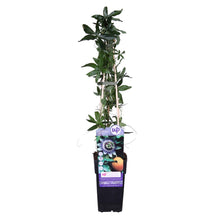Passiflora caerulea, commonly known as the blue passionflower or common passion flower, is a vigorous and exotic-looking climbing vine prized for its intricate and beautiful flowers. This Passiflora species features large, deeply lobed, dark green leaves and produces stunning, complex flowers with a central ring of blue or purple filaments, white petals and sepals, and a prominent yellow corona. The flowers are followed by egg-shaped, orange fruits that are edible but not particularly flavourful. It's a popular choice for trellises, arbors, fences, and walls, adding a touch of tropical beauty and intrigue to gardens and conservatories. It belongs to the Passifloraceae family.
Origin: Passiflora caerulea is native to South America.
Light: Passiflora caerulea thrives in full sun to partial shade. It prefers at least 6 hours of sunlight per day to encourage optimal growth and flowering, but it can tolerate some shade, especially in hotter climates.
Water: Water regularly, especially during dry periods and the first year after planting. Passiflora caerulea prefers consistently moist, well-drained soil. Avoid overwatering, which can lead to root rot.
Soil: This vine prefers fertile, well-drained soil. It can tolerate a range of soil types, but thrives in loamy soil with a slightly acidic to neutral pH.
Support: Passiflora caerulea is a climbing vine that needs support to grow. Provide a trellis, fence, or other structure for it to climb on.
Pruning: Prune your Passiflora caerulea in late winter or early spring to maintain shape and control size. You can also prune lightly throughout the growing season to remove any dead or damaged growth.
Pests and Diseases: Keep an eye out for common pests such as aphids, scale, and spider mites.
Uses: Passiflora caerulea is primarily grown as an ornamental vine for its beautiful and exotic flowers. It's a popular choice for trellises, arbors, fences, and walls, adding a touch of tropical beauty to gardens and landscapes. The fruits are edible but not commonly consumed due to their bland flavour.
Toxicity: The leaves and unripe fruits of Passiflora caerulea contain cyanogenic glycosides, which can be toxic if ingested in large quantities. However, the ripe fruits are generally considered safe to eat.



